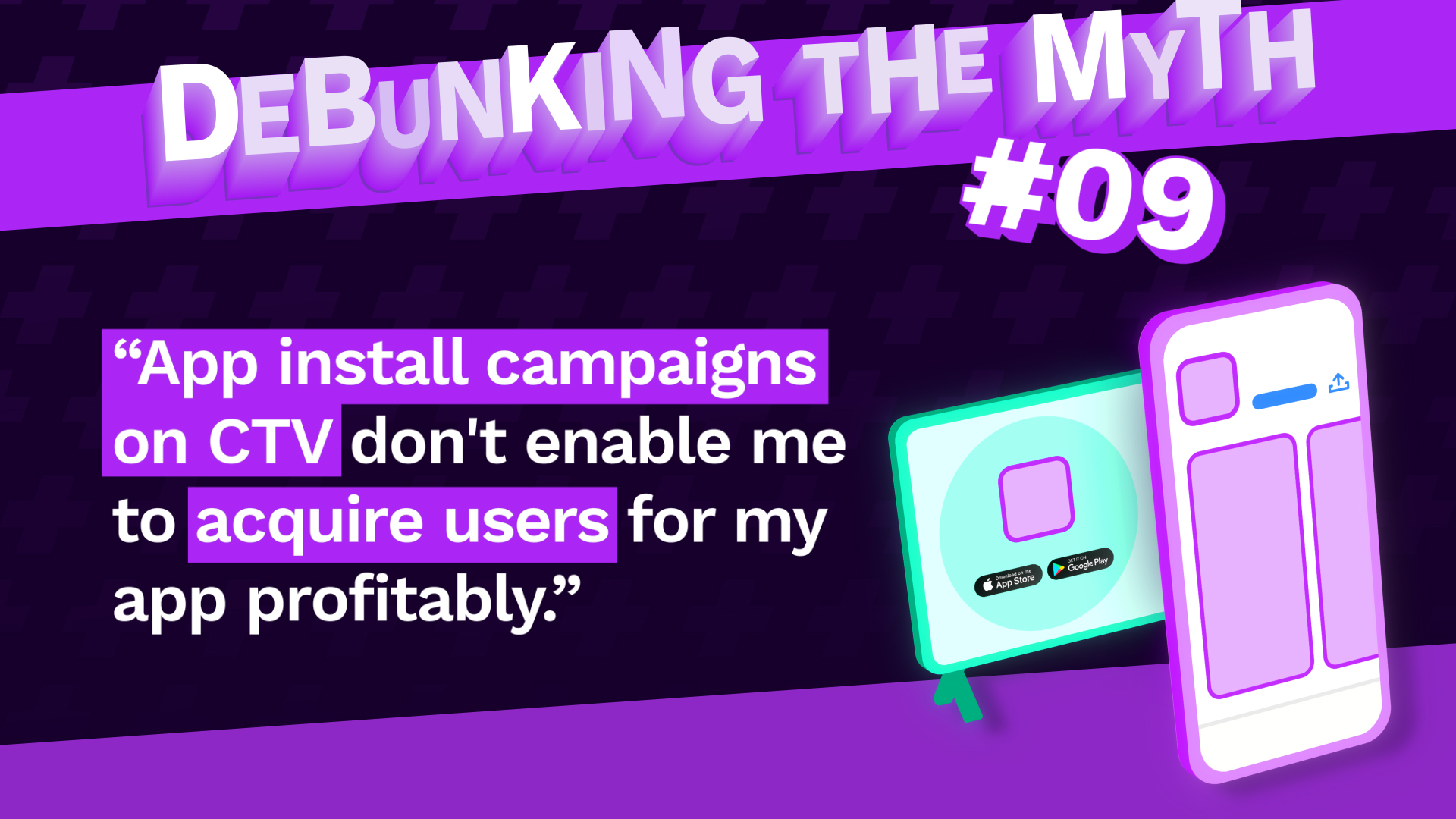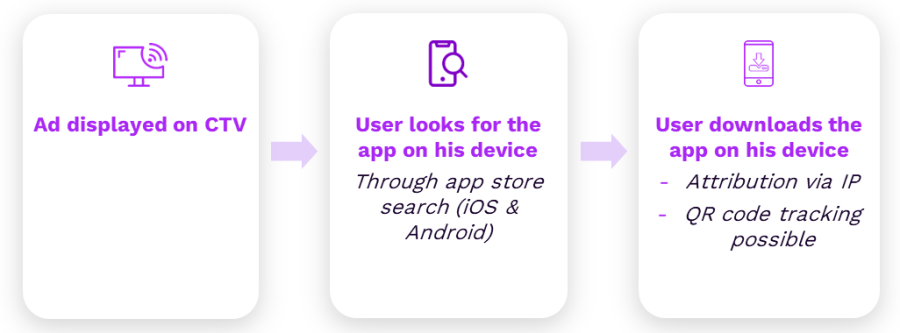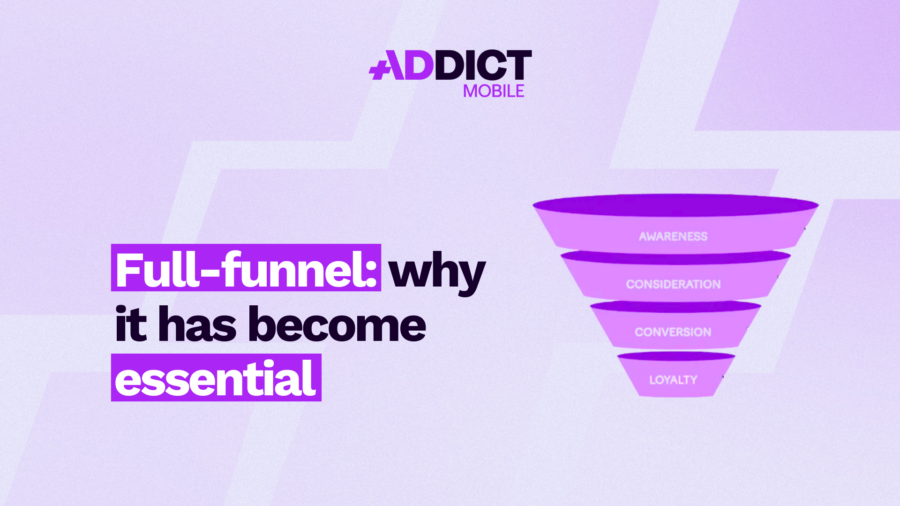DTM #9: CTV isn’t profitable for app install campaigns?

User Acquisition myth #9: App install campaigns on CTV don’t enable me to acquire users for my app profitably
Drawing parallels between CTV and linear TV where advertising primarily serves to enhance brand visibility is tempting.
However, CTV has evolved into a fully-fledged acquisition channel for app install advertising, which can be managed based on performance.
Measure the concrete impact of app install campaigns on CTV thanks to MMPs
Unlike traditional TV, campaign results can be measured much more precisely with connected TV. Attribution is based on a probabilistic method: IP matching. A user with a phone and a TV connected to the same Wi-Fi network, and therefore with the same IP address, can technically be attributed.

When the ad is broadcast, the platform triggers a tracking link. Then, users connected to the same Wi-Fi network, having seen the CTV ad, search for the app on their iOS or Android store and download it. They are then attributed to the platform that broadcasted the advertisement via their IP address. This depends on a pre-configured attribution window being triggered (it is generally recommended not to exceed 12 hours to ensure incremental traffic by limiting attribution), and the user can then be attributed to the specific CTV campaign.
Furthermore, tracking is reliable and widely developed on most MMPs which now support attribution of users from CTV campaigns. If the partner can integrate a tracking URL into the campaign, it becomes possible to obtain visibility on the traffic coming from these campaigns directly within the MMP interface. This allows for managing CTV campaigns based on performance.
CTV to app campaigns are managed exactly like any other app install channel
1. Targeting capabilities related to TV channels
One of the strengths of connected TV is contextual targeting, which makes it possible to target specific channels and thus deploy advertising in line with their audience, such as ESPN for a sports app, or Disney+ for an educational app. This targeting ensures the advertisement is broadcast to an audience that aligns with the product. An increasing number of Publishers are opening their inventories to App campaigns, which reinforces the offerings provided by DSPs that have integrated CTV. Additionally, there are geographical targeting options (by states, regions, countries), by devices, etc.
Moreover, unlike traditional acquisition channels that target individual users, CTV allows advertisers to reach entire households. This is a similar approach to linear television but with added performance-based management capabilities.
2. Purchasing methods moving towards CPI
As the CTV offering has become increasingly diversified and more and more popular with advertisers, a number of DSPs now offer CPI-based campaigns.
While CPM billing promotes campaign distribution, CPI billing reduces risks by ensuring greater cost control.
For the CPI model, it is crucial to define an appropriate CPI to ensure that the DSP can provide the necessary traffic. Setting a too-low CPI can render the campaign ineffective, while a too-high CPI can compromise the overall campaign profitability. Thus, balancing the CPI with the expected ROI is essential.
3. Real-time optimization
In CTV, campaigns are optimized similarly to traditional performance-based acquisition campaigns, unlike linear TV where once the budget is allocated and the advertisement aired, there’s no turning back.
Indeed, since campaign performance is measured in real-time thanks to tracking tools, we can adjust spending mid-campaign based on what is working or not. This precise management makes it possible to quickly gain insights into CPI (Cost Per Installation), optimize campaigns, and adjust ads to progressively improve results.
4. Controlled budgets, limited risks
App install campaigns on CTV are not subject to a minimum investment and do not require a specific time commitment. This makes it possible to test different publishers with smaller budgets to identify the most effective ones, thereby maintaining cost control and only increasing budgets if the results are satisfactory.
However, it’s important to keep in mind to invest a sufficient budget to properly test this channel, as with any other UA source, otherwise, the KPIs will not be representative and will not allow for drawing sufficient conclusions.
With more than a year of experience, including working alongside pioneers such as fuboTV or Wizz, Addict Mobile has honed its CTV approach to ensure optimal performance for its clients.
If you would like to learn more about our services or to schedule a meeting to discuss your needs in more detail, please do not hesitate to contact us.
NEWS
Article in relation

UA Digest #13: What’s new this month?
Discover our User Acquisition Digest, your monthly update on the latest trends and news in performance marketing! Adjust releases its “Mobile App Trends...
Published on 23 February 2026
Full-funnel: why it has become essential in performance…
For a long time, marketing performance was mainly about conversion. Generating purchases, measurable leads, or app installs was enough to steer acquisition strategies....
Published on 9 February 2026
Acquisition Battle #4: Branding Vs Performance
In acquisition, finding the right balance between branding and performance remains a central topic. Branding is often associated with awareness and long-term impact,...
Published on 27 January 2026

